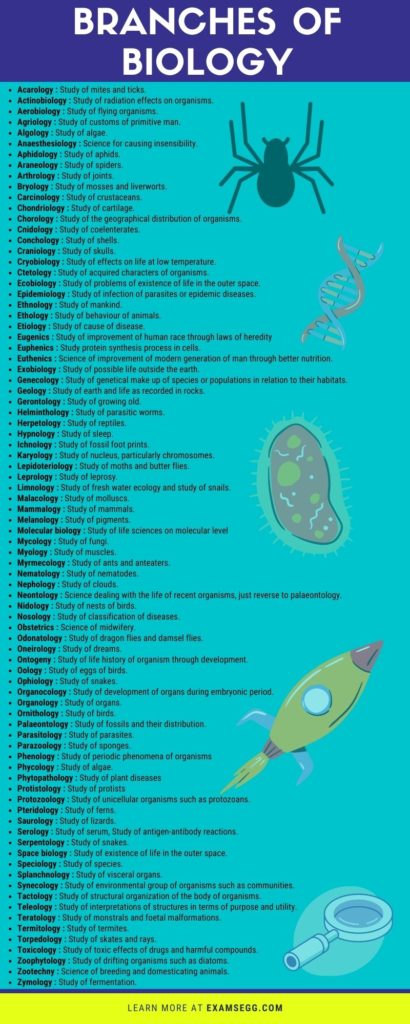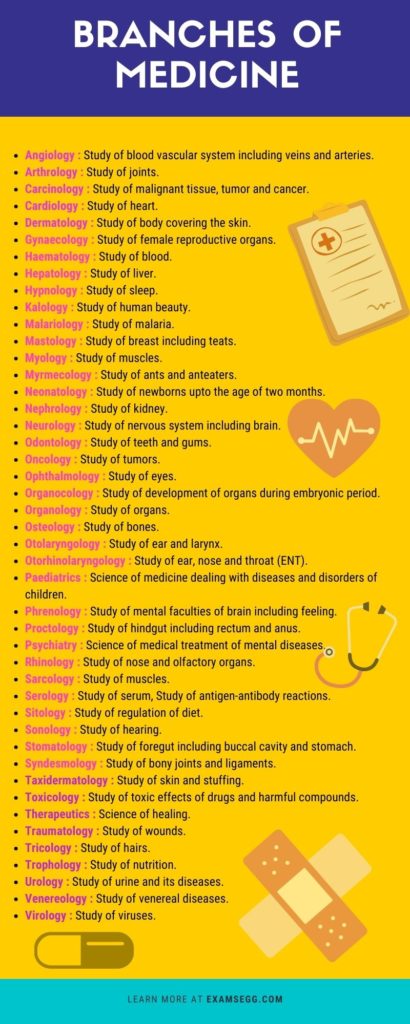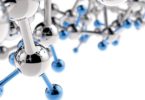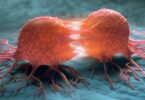Branch of Science and their Description:
- Agrostology: study of grasses
- Astronomy: study of stars and planets
- Cosmetology: study of cosmetics
- Dactylogy: study of fingerprints
- Dietetics: nutrition and diet science
- Lithology: study of rocks
- Orology: study of mountains
- Pathology: study of etiologies, mechanisms and manifestation of diseases
- Radiology: science of x-rays diagnosis and treatment
- Seismology: study of earthquakes phenomena
- Theology: study of religions
Related: scientific instruments list with pictures
Branches of Biology (Zoology and Botany):
Biology is science of living organisms, its sub-branches are:
- Acarology : Study of mites and ticks.
- Actinobiology : Study of radiation effects on organisms.
- Aerobiology : Study of flying organisms.
- Agriology : Study of customs of primitive man.
- Algology : Study of algae.
- Anatomy: study of the animal / human body structure by dissection.
- Anaesthesiology : Science for causing insensibility.
- Aphidology : Study of aphids.
- Araneology : Study of spiders.
- Arthrology : Study of joints.
- Botany: study of plant kingdom
- Bryology : Study of mosses and liverworts.
- Carcinology : Study of crustaceans.
- Chondriology : Study of cartilage.
- Chorology : Study of the geographical distribution of organisms.
- Cnidology : Study of coelenterates.
- Conchology : Study of shells.
- Craniology : Study of skulls.
- Cryobiology : Study of effects on life at low temperature.
- Ctetology : Study of acquired characters of organisms.
- Ecobiology : Study of problems of existence of life in the outer space.
- Endocrinology: study of glands
Related: Blood relation Question
- Epidemiology : Study of infection of parasites or epidemic diseases.
- Ethnology : Study of mankind.
- Ethology : Study of behaviour of animals.
- Etiology : Study of cause of disease.
- Eugenics : Study of improvement of human race through laws of heredity
- Euphenics : Study protein synthesis process in cells.
- Euthenics : Science of improvement of modern generation of man through better nutrition.
- Exobiology : Study of possible life outside the earth.
- Genecology : Study of genetical make up of species or populations in relation to their habitats.
- Geology : Study of earth and life as recorded in rocks.
- Gerontology : Study of growing old.
- Helminthology : Study of parasitic worms.
- Herpetology : Study of reptiles.
- Hypnology : Study of sleep.
- Ichnology : Study of fossil foot prints.
- Karyology : Study of nucleus, particularly chromosomes.
- Lepidoteriology : Study of moths and butter flies.
- Leprology : Study of leprosy.
- Limnology : Study of fresh water ecology and study of snails.
- Malacology : Study of molluscs.
- Mammalogy : Study of mammals.
- Melanology : Study of pigments.
- Molecular biology : Study of life sciences on molecular level
- Mycology : Study of fungi.
- Myology : Study of muscles.
- Myrmecology : Study of ants and anteaters.
- Nematology : Study of nematodes.
- Nephology : Study of clouds.
- Neontology : Science dealing with the life of recent organisms, just reverse to palaeontology.
- Nidology : Study of nests of birds.
- Nosology : Study of classification of diseases.
- Obstetrics : Science of midwifery.
- Odonatology : Study of dragon flies and damsel flies.
- Oneirology : Study of dreams.
- Ontogeny : Study of life history of organism through development.
- Oology : Study of eggs of birds.
- Ophiology : Study of snakes.
- Organocology : Study of development of organs during embryonic period.
- Organology : Study of organs.
- Ornithology : Study of birds.
- Palaeontology : Study of fossils and their distribution.
- Parasitology : Study of parasites.
- Parazoology : Study of sponges.
- Phenology : Study of periodic phenomena of organisms
- Phycology : Study of algae.
Related: Take the Scientific inventions quiz
- Phytopathology : Study of plant diseases
- Protistology : Study of protists
- Protozoology : Study of unicellular organisms such as protozoans.
- Pteridology : Study of ferns.
- Rheumatology: study of small joints in human body
- Saurology : Study of lizards.
- Serology : Study of serum, Study of antigen-antibody reactions.
- Serpentology : Study of snakes.
- Space biology : Study of existence of life in the outer space.
- Speciology : Study of species.
- Splanchnology : Study of visceral organs.
- Synecology : Study of environmental group of organisms such as communities.
- Tactology : Study of structural organization of the body of organisms.
- Teleology : Study of interpretations of structures in terms of purpose and utility.
- Teratology : Study of monstrals and foetal malformations.
- Termitology : Study of termites.
- Torpedology : Study of skates and rays.
- Toxicology : Study of toxic effects of drugs and harmful compounds.
- Zoology: study of animal kingdom
- Zoophytology : Study of drifting organisms such as diatoms.
- Zootechny : Science of breeding and domesticating animals.
- Zymology : Study of fermentation process.
Related: Drug quiz
Branches of Chemistry:
Chemistry is study of elements, their behaviour and laws of their combination
Agrochemistry: Deals with application of Chemistry in agriculture, food processing and environmental remediation.
Physical Chemistry: Physical chemistry gives overall theoretical description of organic, inorganic and analytical chemistry.
Organic Chemistry: It deals with compounds containing carbon. It also helps in petrochemical, pharmaceutical, and textile industries.
Inorganic Chemistry: It deals with non-organic and non carbon containing compounds. Geo-chemistry and bio-organic chemistry are also part of Inorganic chemistry.
Biochemistry: Biochemistry which also known as biological chemistry or physiological chemistry studies chemical composition of living bodies biological molecules like lipids, carbohydrates and proteins etc.
Branches of Medicine:
- Angiology : Study of blood vascular system including veins and arteries.
- Arthrology : Study of joints.
- Carcinology : Study of malignant tissue, tumor and cancer.
- Cardiology : Study of heart.
- Dermatology : Study of body covering the skin.
- Gynaecology : Study of female reproductive organs.
- Haematology : Study of blood.
- Hepatology : Study of liver.
- Hypnology : Study of sleep.
- Kalology : Study of human beauty.
- Malariology : Study of malaria.
- Mastology : Study of breast including teats.
- Myology : Study of muscles.
- Myrmecology : Study of ants and anteaters.
- Neonatology : Study of newborns upto the age of two months.
- Nephrology : Study of kidney.
- Neurology : Study of nervous system including brain.
- Odontology : Study of teeth and gums.
- Oncology : Study of tumors.
- Ophthalmology : Study of eyes.
- Organocology : Study of development of organs during embryonic period.
- Organology : Study of organs.
- Osteology : Study of bones.
- Otolaryngology : Study of ear and larynx.
- Otorhinolaryngology : Study of ear, nose and throat (ENT).
- Paediatrics : Science of medicine dealing with diseases and disorders of children.
- Phrenology : Study of mental faculties of brain including feeling.
- Proctology : Study of hindgut including rectum and anus.
- Psychiatry : Science of medical treatment of mental diseases.
- Rhinology : Study of nose and olfactory organs.
- Sarcology : Study of muscles.
- Serology : Study of serum, Study of antigen-antibody reactions.
Related: space quiz
- Sitology : Study of regulation of diet.
- Sonology : Study of hearing.
- Stomatology : Study of foregut including buccal cavity and stomach.
- Syndesmology : Study of bony joints and ligaments.
- Taxidermatology : Study of skin and stuffing.
- Toxicology : Study of toxic effects of drugs and harmful compounds.
- Therapeutics : Science of healing.
- Traumatology : Study of wounds.
- Tricology : Study of hairs.
- Trophology : Study of nutrition.
- Urology : Study of urine and its diseases.
- Venereology : Study of venereal diseases.
- Virology : Study of viruses.
Branches of Physics:
- Aeronautics: deals with flight through air
- Acoustics: study of sound and its properties
- Astronautics: study of travel outside the Earth’s atmosphere
- Actinology: chemical effects of electromagnetic radiation
- Aerodynamics: study of the motion and control of solid bodies
- Austro physics: deals with physical properties of celestial bodies
- Audiology: science of hearing
Related: Mental ability questions with answers
- Ballistics: study of motion of projectiles
- Cosmology: study of the nature, origin and history of the universe
- Crystallography: deals with structure of crystals
- Dynamics: behaviour of bodies under the action of forces which change their motion
- Electronics: study of circuit involving thermionic values, semi conductors and other electrical components like resistance, capacitors, inductances
- Electrostatics: study of the effects associated with electric charge at rest
- Fluidics: study of fluid flow through pipes in an analogous way to the flow of electric current through circuits
- Electromagnetism: study of forces between electrically charged particles
- Holography: Science of recording three dimensional image of an object
- Mechanics: deals with behaviour of objects and systems under / in response to various forces.
- Kinematics: effect of motion without reference to mass or force
- Nuclear physics: deals with study of atomic nucleus and nuclear reactions
- Optics: Study of nature and properties of light
- Plasma physics: study of highly ionized gases
- Quantum physics: study of electromagnetic radiation
- Relativistic Physics: studies light and speed of light
- Rheology: study of the deformation and flow of matter
- Solid state physics: study of physical properties of solid material
- Statistical Mechanics: study of the mechanical properties of large assemblies of particles in terms of statistics
- Temperature physics: deals with maintenance of temperature
Related: Test your Asia geography knowledge
- Thermodynamics: study of heat and other forms of energy
- Tribogy: study of friction and lubrication









गुड
these are only bio science branches, please add physical and chemical branches of science. anyway thanks for info